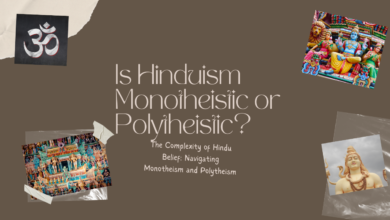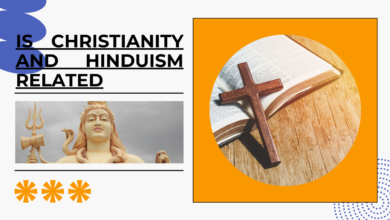Is Hinduism Monotheistic?
Navigating the Complexities of Hindu Belief: Monotheism, Polytheism, and Beyond
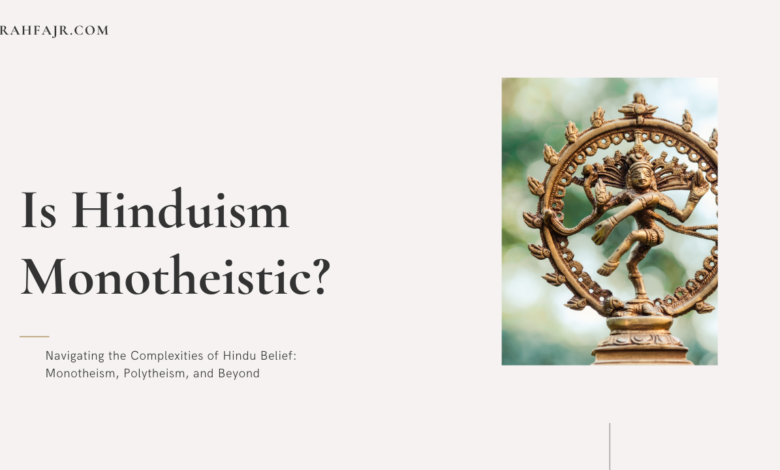
Is Hinduism Monotheistic?
No, Hinduism is not typically considered a monotheistic religion. It is often described as henotheistic or even polytheistic.
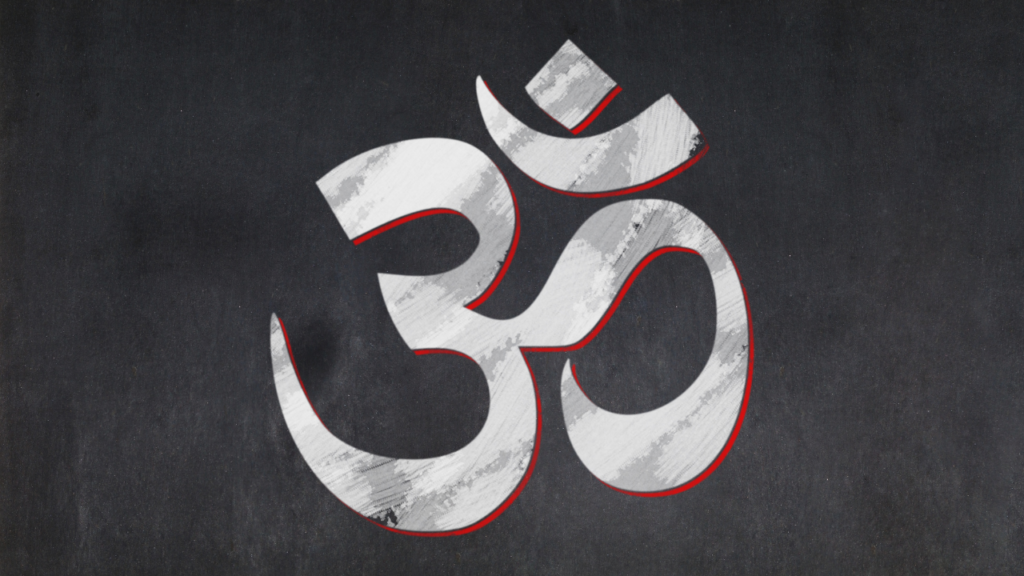
Introduction
Hinduism is one of the world’s oldest and most diverse religious traditions, with a rich tapestry of beliefs, practices, and philosophies. While it is often characterized as a polytheistic religion due to its vast pantheon of deities, the question of whether Hinduism is monotheistic is a subject of debate among scholars and practitioners. To understand this complex issue, we must delve into the multifaceted nature of Hinduism.
The Polytheistic Perspective
At first glance, Hinduism appears to be a polytheistic religion. It boasts a multitude of deities, each with distinct roles and attributes. These deities are often worshiped in the form of idols, images, or symbols in temples and homes, and devotees offer prayers and rituals to these gods and goddesses.
Among the most widely venerated deities are Brahma (the creator), Vishnu (the preserver), and Shiva (the destroyer). There are also countless regional and local deities, each with their own devoted followers. This plethora of deities can lead outsiders to conclude that Hinduism is unequivocally polytheistic.
The Monotheistic Perspective
Despite the apparent polytheism, Hinduism does have a monotheistic strain. The concept of Brahman, the ultimate, unchanging, and formless reality, represents the monotheistic aspect of Hinduism. Brahman is considered the source and essence of everything in the universe, including all the deities. This concept is closely tied to the idea that all the individual deities are manifestations or aspects of this one supreme reality.
The Advaita Vedanta school of Hindu philosophy, founded by Adi Shankaracharya, emphasizes the non-dual nature of reality and holds that there is only one ultimate reality, which is Brahman. According to this school of thought, all distinctions between deities and the material world are illusory, and only Brahman exists as the absolute reality. In this interpretation, Hinduism leans more toward monotheism.
Also Check
- Is Christianity and Hinduism related?
- Is Hinduism Monotheistic or Polytheistic?
- When I think of Christmas?
- Why theft is prohibited in Islam?
- Who is the God in Islam?
The Henotheistic Perspective
Another way to understand Hinduism’s relationship with monotheism is through the lens of henotheism. Henotheism is the belief in and worship of a single god while acknowledging the existence of other deities. This perspective accommodates the simultaneous worship of one’s chosen deity while recognizing the validity of other gods and goddesses.
Many Hindus follow a henotheistic approach by having a particular deity as their primary focus of worship. They may hold a deep devotion to Vishnu, Shiva, Devi (the goddess), or other deities, considering their chosen god as the ultimate divine source, even while acknowledging the presence of other deities in the pantheon.
The Complexity of Hindu Belief
Hinduism’s seemingly contradictory nature arises from its inclusivity and adaptability. Unlike most other major religions, Hinduism lacks a single founder or central religious authority, which has allowed for a wide range of beliefs and practices to coexist under its umbrella. Hinduism’s adaptability and diversity are intrinsic to its nature, accommodating different belief systems and interpretations.
Conclusion
In the debate over whether Hinduism is monotheistic or polytheistic, the answer is multifaceted. Hinduism’s complexity allows for various perspectives, including monotheism, polytheism, and henotheism, to coexist within its framework. The concept of Brahman as the ultimate reality provides a monotheistic dimension, while the rich pantheon of deities reflects a polytheistic aspect. Ultimately, it is the inclusivity and diversity of Hinduism that make it a profound and enduring religious tradition that defies easy categorization. Understanding Hinduism as a diverse, multifaceted belief system can help us appreciate its richness and complexity.
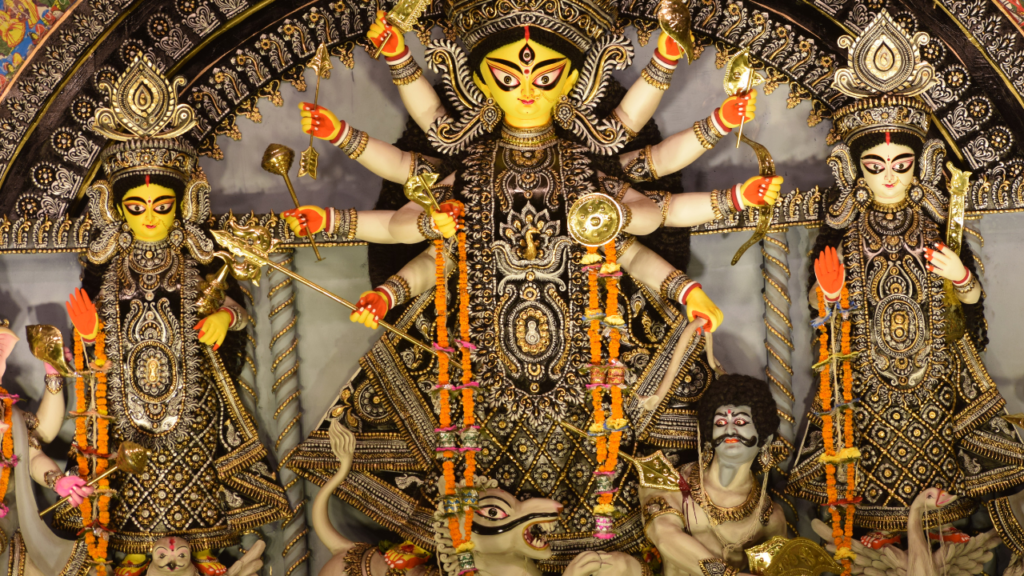
(FAQs) about whether Hinduism is monotheistic?:
Is Hinduism a monotheistic religion?
No, Hinduism is not typically considered a monotheistic religion. It is often described as henotheistic or even polytheistic.
What does monotheism mean?
Monotheism is the belief in and worship of a single, supreme deity or god.
Are there any monotheistic aspects within Hinduism?
Yes, some sects and philosophical traditions within Hinduism, such as Advaita Vedanta, emphasize the idea of a single, formless, and all-encompassing divine reality (Brahman). However, these perspectives are not universally accepted within Hinduism.
How is Hinduism different from monotheistic religions like Christianity and Islam?
Hinduism encompasses a wide range of beliefs and practices, including the worship of multiple deities (polytheism), which is a key distinction from monotheistic religions like Christianity and Islam.
Who are the major deities in Hinduism?
Hinduism features a multitude of gods and goddesses, with Brahma (the creator), Vishnu (the preserver), and Shiva (the destroyer) often considered the principal deities. However, there are numerous other deities as well.
Can a person be a monotheist within the framework of Hinduism?
Yes, some Hindus choose to focus exclusively on one deity, such as Vishnu or Shiva, and maintain a monotheistic devotion to that particular god.
How does the concept of Brahman fit into the discussion of monotheism in Hinduism?
The concept of Brahman is often seen as a monistic or non-dualistic understanding of the ultimate reality. While it can be considered monotheistic in the sense of a single, all-encompassing divine source, it is different from the typical monotheistic concept of a personal God.
Are there any scriptures in Hinduism that emphasize monotheism?
Some texts, like the Bhagavad Gita and certain Upanishads, contain monotheistic ideas by emphasizing devotion to a single deity or the oneness of the self (Atman) with the ultimate reality (Brahman).
Does the belief in multiple deities make Hinduism polytheistic?
Yes, the belief in and worship of multiple deities is a characteristic of polytheism, which is present in many aspects of Hindu religious practice.
Can one be a monotheist and a polytheist simultaneously in Hinduism?
In Hinduism, there is a great deal of flexibility in one’s beliefs and practices. Some individuals may adopt a monotheistic devotion to a single deity while also acknowledging and respecting the existence of other deities in the pantheon.
